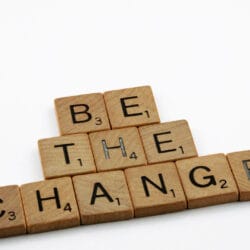About Changemaker The minimalists, Joshua & Ryan, help millions of people learn to live better…
As many hope to move on from the pandemic, enforced changes to people’s life have created unwelcome post-pandemic stress and even rage.
We have seen an alarming rise of incidents of rage in recent months and weeks gaining more and more traction and attention in the news. Clearly, post-pandemic stress is coming out in full swing as post-Covid rage. That pressure-cooker lid that has been forced shut by being indoors is now coming off as people enter a changing world forced upon them.
People are leaving the world they knew before the lockdown, a place that might not have been liked but was familiar, to a new world where so many more rules are in place, with so many restrictions on freedom, and where people have also now realized what matters most in life after possibly seeing people they knew (or knew of) die in such a world-changing event.
We often associate rage with people who are labeled ‘crazy’ or ‘control freaks’, yet rage is an underlying emotion that can build up in anyone over seemingly any little thing (in due course) if not allowed to be diffused or let out in a more productive way.
The pandemic has undoubtedly promoted many cases of post traumatic stress. So what exactly is this?
What Is Post Traumatic Stress Disorder?
Post-traumatic stress often occurs after a serious event. It can be immediate but sometimes also only comes out long after the triggering event. The event can cause a heightened sense of fear or danger to the point where the individual feels on edge over many otherwise normal encounters.
When your life has been thrown into a washing machine you’re are going to get dizzy. This is what has happened to many during the pandemic. It’s no zorbing. We didn’t choose to jump in a ball that rolls down a hill. The pandemic wasn’t fun. It was a challenge, an unwanted challenge.
When this happens people are way out of their comfort zone and don’t know how to act or cope. The longer it goes on the more coping strategies, but this can include an underlying numbness in order to cope.
So when it feels like there could be light at the end of the tunnel, all that actually happens is the numbness is awoken and the fear becomes even more present than it was before. It’s like a zombie coming back to life to a world they are unaware of.
“When your life has been thrown into a washing machine you’re are going to get dizzy”
Stress is often associated with memories, even false ones. We tend to see what we want to see in normal times, but with PTSD we tend to only see what we don’t want to see. We remember times of difficulty that make the healing process harder to go through.
The longer the pandemic has gone on the more likely people will have underlying PTSD when we emerge, and this is creating a whole catalogue of irrational actions such as an increase in air-rage and a dramatic shift in trust.
This article underlines what is happening, why, and how it is creating a bigger change in how we live.
How Can Post-Pandemic Stress Surface Seemingly Out Of Nowhere?
As case in point is my own recent run-in with my long-term fiancee. As far as couples go we have actually done pretty well being couped up in a small place together for months (we chose to downsize from our previous place as Covid took its toll on both of our businesses). Financially that was a wise decision but it certainly took a lot of adjusting to live and work under the same roof, with much less room to manoeuvre.
However, we dealt with the situation pretty well, putting up makeshift dividers for focus areas. We made one small veranda a chill-out section (when the washing machine wasn’t on), and found a schedule that pretty much worked for both of us (although we both had to exercise patience with each other at times).
Then suddenly, one day, as I was writing an article piece for a growing online magazine about Why Taking Our Innovative World For Granted Is A Mistake, I found myself unsure about the article and appreciated it if she would just listen for a second whilst I read it out to her for feedback.
Now, this is not something I often do, and despite sending numerous articles to her through a social messenger app (but not always expecting her to read then) something got my back up.
It suddenly wasn’t just about my fiancee, who seemingly was more bothered about playing her phone game, but it sent a wave of frustrating memories through my mind about all the recent times I’d sent an article I wrote to a friend or family member (in seeking a bit of compassionate support, whether they liked the article or not), but who also couldn’t find the time to read it (but found ample time for TV and so forth).
I’m sure people can relate to this feeling of worthlessness when you don’t get the compassionate support you seek from those you think care about you. Now, of course, they do care about you, but many of us often don’t realize just how much it means to show some genuine interest in what someone else is interested, instead of what we are interested in.
It sent a shockwave of hurt through my bones when I was flat-out ignored whilst reading it and a verbal fight ensued with both of us saying stuff we didn’t mean. We clearly aren’t the only couples to have had a fight. While ours wasn’t rageful it certainly had blood boiling slightly to the point where we exercised our coping strategies in place.


Now this may sound like a petty argument, something ridiculous to some, but it got me thinking about what was really going on underneath, and why.
Just how much this may be because of not feeling compassion from a loved one, and how much of this is a deeper feeling of isolation that a year and a half of Coronavirus has promoted?
It also gets you thinking in how other people will feel the same.
- Is my fiancee feeling the same in something meaningful to her that isn’t getting enough compassion from me?
- Are we becoming more and more selfish in our own endeavors because society has drilled us into worker bees who aren’t respected, so we seek compassion even more from those we love?
- Are we over-sensitive in today’s victim mentality world?
- Is rage an acceptable release considering the unprecedented times and experiences we have collectively gone through (so long as it is not directed at others)
- Should we just double down on our own meditation?
Safe to say, it promoted a lot of curious questions that didn’t have easy answers to.
The World Is Changing (Why People Are Pissed Off)
Incidentally, my experience actually led me to just write MORE, rather than give up which initially felt like the best solution.
There’s certainly some truth that negative experiences can actually be a positive motivation (so long as they are managed productively).
So, if that is true then why do we have a world that is frankly pissed off right now? One where we are full to the bones in negative experiences of the last year or so?
As we come closer and closer back to ‘normality’ we may realize that what we thought was safe and comfortable before isn’t right for us anymore. In fact, it wasn’t even normal.
For many, it was a soul-crushing existence where people would wake up, get stuck in traffic, be stuck in a cubicle doing tasks that would promise financial rewards in exchange for your soul, and then head back home through more traffic and just in time for dinner, and maybe a few hours of tired goggleboxing in front of the TV watching other people seemingly having a wonderful life and ingraining a pattern of vicarious living and worthlessness that is also meant to be the highlight of their day.
So, when you add a life restriction of being locked in another cage all day through the pandemic then it’s natural for stresses to build up.
“Before the positive motivation can take place we have to deal with the reality of the negative experience and what truths it uncovers”
It eventually leads to a recognition that life has to be better than this, so people become determined to change their fate once the light begins to emerge at the end of the tunnel, but the longer the pandemic drags on the less people feel that is going to be the case.
Meanwhile, the elites make more money than ever before capitalizing from the stay-at-home tech and delivery that upsells consumers who have little else to do other than shopping therapy.
All of this compounds. It builds up more resentment which delays any positive motivation.
Eventually, it also builds up awareness that it shouldn’t be normal. After all, once your mind stretches to a new dimension it just doesn’t go back to its original dimensions, so the enforced changes on people have changed our collective perception.
And while we can benefit from finding a way to, at the very least, express our emotions productively rather than keep them caged up, it actually has to go further than that considering the scale of such an event.
Change Requires A Different Mindset To Comfort
Even before the pandemic, we were somewhat accustomed to a new world of mindfulness trends. People were already seeking ways to either escape reality or transcend it. That same tactic alone might well not be enough post-pandemic though. There’s a lot of undealt with mental trauma that will surface more and more as people begin to shift to the reality of their new world.
Whilst in lockdown people coped through firmly holding that comfort blanket tight and hoping things wouldn’t get worse, whilst dealing with things on a day-by-day basis.
Yet, we are not able to sustain such resilience long-term, simply because the energy involved makes it a short-term solution (just like meditation has to be repeated to be effective).
What we are seeing is a world in the midst of a grander change. It’s not just about governments and elites taking more control over the freedoms of the people, even though it may feel like it when subjected to all the pandemic rules. We are seeing bigger waves of change in value systems and behavioural paradigms the world over.
People were so used to order. The same daily routines and the gradual step up the ladder to a more comfortable life. Yet, something has been festering for a long time.
The idea of getting a steady 9-5 job and working up to a steady life is an ideal that is getting older and older. Younger people recognize that technology afforded more opportunities to live a different kind of life, and that is on the whole a good thing.
However, the pandemic has forced more minds to catch up to technology (we already had) to accelerate the rate of change towards a more flexible and less controlled working environment (in theory), and the ideal of the 9-5 status-seeking job has only become less and less desirable.
On top of that, people don’t actually like order. It was just comfortable, but it was also often soul-crushing for many in steady 9-5 jobs, so when a change takes away the initial comfort blanket people aren’t going to stay solely for the soul-crushing. They will want to change their situation to wherever is now the most comfortable.


Amongst all of this we have seen the rise towards social inequality awareness movements spread fast through social media. It didn’t take too long until the corporations realized they had to play ball and at least look as though they were taking social responsibility and started angling their philosophy towards human-centred ideals.
As a long term UX designer and design thinker, I’ve seen this movement in products and services shift towards a more human-centered approach happen gradually over the last decade, but much of it was about making users ‘happy’ with an easier layout-flow or user interaction etc, all part of a strategy to make users buy more of something, whether they needed it or not. It was designed to make people comfortable and let technology handle our lives, but now the pandemic has changed that and we are realizing in our lives that comfort isn’t something that will provide us what we need, despite everything in our energy-preserving power to try and keep us within it.
All of this is forcing a change in how people perceive things. Our comfort zone was indeed comfortable, if not a bit numb, but now people have been abruptly shaken from it and this is causing a rise in fear and, inevitably, anger and rage.
It’s like thunder and lightning going off around their house and they want to stay safe in that house but are being forced to get out into the open elements as it’s starting to flood.
With this rise in fear and forced change people essentially seek comfort naturally somewhere else, and this is what we are seeing with The Great Resignation today.
The Great Resignation Is Just The Start To A New Shift In Thinking
When our house has been rocked people feel unsteady. Their natural next step is to look for comfort elsewhere. If you associate your home with a lockdown prison then you don’t search there for comfort. People want to get out of the house more than ever, but they don’t really know where to go. The next place to home, often our jobs.
The need for compassion in jobs now only increases.
Going back to my personal example, if I didn’t get praise from home (on articles) then where becomes my go-to for compassion? It comes from finding a group of like-minded people who are in the same boat of seeking to help people and humanity change for the better.
I could argue underneath that this is why I created this website in the first place. To find solace in like-minded changemakers, as human’s desire for compassion is very strong and an inbuilt need for our own survival. If we don’t get it at home we have to seek it elsewhere, or we feel lost.
So, it comes as no surprise that people are seeking to be a part of The Great Recognition. In itself, it’s also part of a collective moment that gives people a sense of belonging.
“When your house has been rocked you feel unsteady”
However, we need to be careful in thinking seeking compassion from others will solve our own issues with facing change. Seeking compassion is often a bit of a desired safety net, rather than an actuality.
The fact is that change (by its very nature) is uncomfortable for many. So, seeking to change jobs or environments, as much as it is desired on one level (now people know they deserve to be treated better) it is also uncomfortable in unfamiliarity on the other.
Therefore, it’s no surprise we are seeing more incidents of rage as people navigate changing environments. It may be seen as a necessary shift as people become more used to a changing world, but that doesn’t mean taking your rage out on others is acceptable.
How To Deal With Change In A Manageable Way
The best solution for an angry world would be to address our own pre-conditioned habits that resist change, and to drop what we can’t be in control of anyway.
Seeking to adapt to changes in your day doesn’t have to be such a grand-scale event like quitting your job and hoping for someone else to be more compassionate elsewhere. It doesn’t mean sticking in a job that is soul-crushing either.
What it does mean is accepting that change happens around you, that you can’t control, but what you can control is the changes you make in yourself each day to be able to adapt easier.
As my very wise friend said:
‘Deep down everyone wants everyone else to go for it, to change, or contribute a difference, etc. but fear, laziness, habits, etc. get in the way’
J Bradley
We are hard-wired to take the easy road, so when challenged to change many find it exhausting and scary, so making small measurable changes in our day is the best solution. Seeking compassion might certainly help you feel better momentarily but it is also something often out of your control. Self-compassion is in your control.
It’s understandable to blow off steam when frustration builds, but learning to channel that fear or change to a productive tool you can use to help you is far more beneficial.
When change feels in your control, and when it is accepted as a part of life, then your mind becomes less likely to seek a comfort zone that no longer suits you, and that will just lead you to fall back into soul-crushing existence rather than to take responsibility for making your own meaningful change.
As for being compassionate. We can actually find we have more compassion come back to us when we seek to help others on their journeys too, rather than just expect people to understand our difficulties. One of the best antidotes to rage is kindness. So, to make change easier then co-compassion certainly helps, if possible.
However, the real key to dealing with change comes from accepting change as an everyday part of your day, even in little ways. That way the pressure-cooker won’t blow over as you will have it firmly under your control.









